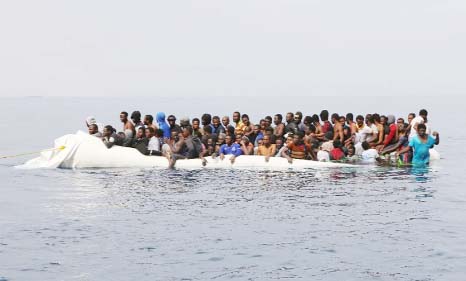
AFP, Durban (South Africa) :
African countries are becoming increasingly repressive and causing more people to leave their homes, British charity Oxfam said this week, as Germany warned of the destabilising effect migration is having on the continent.
Political freedom and the problem of Africa’s brain-drain were among the leading issues on the agenda at the World Economic Forum on Africa held in Durban which wrapped up on Friday.
Oxfam’s executive director Winnie Byanyima said that “repressive laws on freedom of association and speech” were “a driver of migration.”
German Finance Minister Wolfgang Schaeuble warned at the gathering that “if we fail to stabilise the African continent in the years and decades to come, we will face increasing geopolitical risks”-including more migrant arrivals in Europe.
South African President Jacob Zuma, who hosted the forum of African movers and shakers, described the handling of migration as among the “critical challenges facing the world”.
The total number of migrants worldwide reached 244 million in 2015, and among them a record 63 million were forced to leave their homes, including refugees, people displaced within their own countries and asylum seekers, the World Food Programme said Friday.
Byanyima said that massive outflows from Africa were a damning verdict on the performance of the continent’s political class.
“That is a judgement on the leadership we have on our continent, failing to create economic opportunities for their people,” she told AFP.
“In many of those countries you have repressive illegitimate regimes that spend the money that should go toward empowering their people on security systems, on monitoring their people, oppositions and silencing media.”
A recent survey by CIVICUS, which monitors freedoms worldwide, found that only two African countries were fully open-the island nations of Cape Verde and Sao Tome & Principe.
Not one country on the African mainland was found to be free.
Byanyima also criticised wealthy governments which have diverted their aid budgets into covering the costs of refugee arrivals.
“Rich countries must stop repurposing aid, they must maintain aid for the conflict-affected countries. They must not divert it to meeting refugee costs in their countries or their security needs. They must maintain it for fighting poverty,” she said.
“If they help to make countries stable, to achieve inclusive growth then people will not want to leave their homes. Development cooperation is a tool for peace and stability.”
African countries are becoming increasingly repressive and causing more people to leave their homes, British charity Oxfam said this week, as Germany warned of the destabilising effect migration is having on the continent.
Political freedom and the problem of Africa’s brain-drain were among the leading issues on the agenda at the World Economic Forum on Africa held in Durban which wrapped up on Friday.
Oxfam’s executive director Winnie Byanyima said that “repressive laws on freedom of association and speech” were “a driver of migration.”
German Finance Minister Wolfgang Schaeuble warned at the gathering that “if we fail to stabilise the African continent in the years and decades to come, we will face increasing geopolitical risks”-including more migrant arrivals in Europe.
South African President Jacob Zuma, who hosted the forum of African movers and shakers, described the handling of migration as among the “critical challenges facing the world”.
The total number of migrants worldwide reached 244 million in 2015, and among them a record 63 million were forced to leave their homes, including refugees, people displaced within their own countries and asylum seekers, the World Food Programme said Friday.
Byanyima said that massive outflows from Africa were a damning verdict on the performance of the continent’s political class.
“That is a judgement on the leadership we have on our continent, failing to create economic opportunities for their people,” she told AFP.
“In many of those countries you have repressive illegitimate regimes that spend the money that should go toward empowering their people on security systems, on monitoring their people, oppositions and silencing media.”
A recent survey by CIVICUS, which monitors freedoms worldwide, found that only two African countries were fully open-the island nations of Cape Verde and Sao Tome & Principe.
Not one country on the African mainland was found to be free.
Byanyima also criticised wealthy governments which have diverted their aid budgets into covering the costs of refugee arrivals.
“Rich countries must stop repurposing aid, they must maintain aid for the conflict-affected countries. They must not divert it to meeting refugee costs in their countries or their security needs. They must maintain it for fighting poverty,” she said.
“If they help to make countries stable, to achieve inclusive growth then people will not want to leave their homes. Development cooperation is a tool for peace and stability.”

